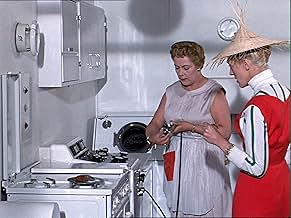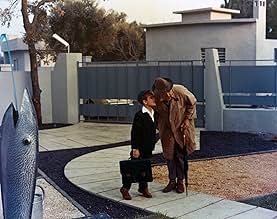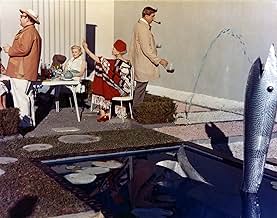Mon oncle
- 1958
- Tous publics
- 1h 56min
NOTE IMDb
7,6/10
25 k
MA NOTE
M. Hulot visite le monde technologique de sa soeur, de son beau-frère et de son neveu, mais ne parvient pas vraiment à s'adapter à cet environnement.M. Hulot visite le monde technologique de sa soeur, de son beau-frère et de son neveu, mais ne parvient pas vraiment à s'adapter à cet environnement.M. Hulot visite le monde technologique de sa soeur, de son beau-frère et de son neveu, mais ne parvient pas vraiment à s'adapter à cet environnement.
- Réalisation
- Scénario
- Casting principal
- Récompensé par 1 Oscar
- 7 victoires et 4 nominations au total
Jacques Tati
- Monsieur Hulot
- (non crédité)
Lucien Frégis
- Monsieur Pichard
- (as Lucien Fregis)
Jean-François Martial
- Monsieur Walter
- (as J.F. Martial)
Alain Bécourt
- Gérard Arpel
- (as Alain Becourt)
Régis Fontenay
- Braces Dealer
- (as Regis Fontenay)
Daki
- Daki, the Arpels' Dachshund
- (non crédité)
Dominique Derly
- La secrétaire de Monsieur Arpel
- (non crédité)
- …
André Dino
- Le balayeur municipal
- (non crédité)
- …
Avis à la une
Jacques Tati needs a statue in the movie history hall of fame. He will have it, eventually. As an actor, he created Monsieur Hulot, a sort of post-modern Chaplin, walking through the world as estranged and yet delighted, as a middle-aged ET. As a director, he did about the same thing, but added a visual brilliance, a classical sense for the absurd, and a lot of poetry.
Mon oncle, My uncle, is pretty much the manifesto of his artistic raison d'etre. The uncle, Monsieur Hulot, with his timeless, almost zen-like attitude to life, is contrasted by the successful bourgeoisie family, trying so hard to shine. What happens in the movie, is simply the little everyday absurdities rising out of this meeting of contradictions.
Tati makes fun of everyone, but in such a gentle and loving way, no one gets hurt. He is truly enjoying himself, when observing the little madnesses of modern man. There is no call for anyone getting really angry at anyone else.
Still, there are statements, and they are provoking if pondered. Tati probably succeeded in balancing the 1950's unreserved delight in consumer gluttony, with a bit of a taoist reconsideration as to the significance of it all. Without Tati and his movies, it is quite likely that we would have taken much longer in glimpsing the futility of earthly possessions, and that which has for the last half-century been called progress.
And contrary to many other movies of up to the same age, Mon oncle carries the years with just as straight a posture as the one of Monsieur Hulot. They should show this movie in the schools, so that all kids get to see it and reflect.
Mon oncle, My uncle, is pretty much the manifesto of his artistic raison d'etre. The uncle, Monsieur Hulot, with his timeless, almost zen-like attitude to life, is contrasted by the successful bourgeoisie family, trying so hard to shine. What happens in the movie, is simply the little everyday absurdities rising out of this meeting of contradictions.
Tati makes fun of everyone, but in such a gentle and loving way, no one gets hurt. He is truly enjoying himself, when observing the little madnesses of modern man. There is no call for anyone getting really angry at anyone else.
Still, there are statements, and they are provoking if pondered. Tati probably succeeded in balancing the 1950's unreserved delight in consumer gluttony, with a bit of a taoist reconsideration as to the significance of it all. Without Tati and his movies, it is quite likely that we would have taken much longer in glimpsing the futility of earthly possessions, and that which has for the last half-century been called progress.
And contrary to many other movies of up to the same age, Mon oncle carries the years with just as straight a posture as the one of Monsieur Hulot. They should show this movie in the schools, so that all kids get to see it and reflect.
I only recently discovered the work of Jacques Tati. As a fan of the great movie comedians-auteurs (Chaplin, Keaton, Brooks, Allen), I wanted to see Tati's work. So far, I have only seen PLAYTIME, MR. HULOT'S HOLIDAY and finally, just recently, MON ONCLE. I can easily say MON ONCLE is not only the greatest comedy of Tati, but also one of the finest comedies ever made. It is truly hilarious. I found MR. HULOT'S HOLIDAY to be just a bit slow at times, where I might find myself losing interest for a moment. PLAYTIME was a bit too "mainstream" with many big special effects and so on. But MON ONCLE is simple yet hilarious. For 117 minutes, Tati keeps the viewer in his own world of comedy. The ultra-modern house gadgets were hilarious, making for some very funny sight gags. Tati's Mr. Hulot character belongs in a gallery of great comic film personas, along with Chaplin's Little Tramp, Keaton's Great Stone Face, Allen's neurotic New Yorker, and Brooks' Jewish characterizations. MON ONCLE is also beautifully photographed in color, which adds a lighter touch to the comedy. I've noticed that Tati's films are unlike those of anyone else. The style is all his own.
This was my introduction to the world of Jacques Tati...and I liked it. If Tati's filmmaking M.O. was to remind us of Charlie Chaplin & Buster Keaton, mission very successfully accomplished. 'Mon Oncle' could have been a silent film. It uses sound effects and music to tell 75% of the story anyway, just as Charlie and Buster and their contemporaries did so well in the talk-free era. He also has their simplicity of camera movement. And as with those film giants, Tati is the star/director/producer and co-writer of this project. His recurring Monsieur Hulot character isn't as famous as the Little Tramp, but the quirky Frenchman is just as bumbling and likable.
In line with Chaplin's 'Modern Times', the theme of 'Mon Oncle' is the inability of one man to adapt to new technology. The slapstick sequences that result from the clash of man versus machine are more amusing than truly hilarious. There are a few big laughs, but you'll smile more than than you'll guffaw. There's no standard plot. Hulot's sister, her husband, and their son live in an ultra-modern '50s house. (This weird set is truly magnificent.) Occasionally, they have trendy guests---the out-of-place Hulot among them---and he inadvertently gets the ball of chaos rolling. If his sister's house is too bizarre for him, he still gets to enjoy old-fashioned pleasures in other areas of France. He doesn't fit in with these social climbers, but the man is charming and unflappable in his own eccentric way.
This movie looks as stunning as Hitchcock's 'Vertigo' (also released in '58). Both pictures use colour extraordinarily well (especially green) and Tati's film would be worth seeing for the visuals alone. He also makes it a delightful aural experience with a jaunty music score and comical sound design. It's not all a cold technical exercise, though. The acting is a bit exaggerated (except for Tati's underplaying), but they only look foolish in the name of laughs. Will you enjoy a French comedy from nearly 50 years ago? Is 'Mon Oncle' just a critical darling (Oscar for Foreign Language Film, a prize at Cannes) and not an audience picture? Hey, I didn't think I'd be entertained by a two-hour French trifle, but I was. Rent the Criterion DVD and drink in the plush visuals, then have some grins. Come for the pretty, stay for the witty.
In line with Chaplin's 'Modern Times', the theme of 'Mon Oncle' is the inability of one man to adapt to new technology. The slapstick sequences that result from the clash of man versus machine are more amusing than truly hilarious. There are a few big laughs, but you'll smile more than than you'll guffaw. There's no standard plot. Hulot's sister, her husband, and their son live in an ultra-modern '50s house. (This weird set is truly magnificent.) Occasionally, they have trendy guests---the out-of-place Hulot among them---and he inadvertently gets the ball of chaos rolling. If his sister's house is too bizarre for him, he still gets to enjoy old-fashioned pleasures in other areas of France. He doesn't fit in with these social climbers, but the man is charming and unflappable in his own eccentric way.
This movie looks as stunning as Hitchcock's 'Vertigo' (also released in '58). Both pictures use colour extraordinarily well (especially green) and Tati's film would be worth seeing for the visuals alone. He also makes it a delightful aural experience with a jaunty music score and comical sound design. It's not all a cold technical exercise, though. The acting is a bit exaggerated (except for Tati's underplaying), but they only look foolish in the name of laughs. Will you enjoy a French comedy from nearly 50 years ago? Is 'Mon Oncle' just a critical darling (Oscar for Foreign Language Film, a prize at Cannes) and not an audience picture? Hey, I didn't think I'd be entertained by a two-hour French trifle, but I was. Rent the Criterion DVD and drink in the plush visuals, then have some grins. Come for the pretty, stay for the witty.
A truly lovely film, beautiful photography, lovely sets, warm, funny and sad all at the same time.
Perhaps not as funny as M Hulot's Holiday, what could be funnier than the scene of him playing table tennis in the hotel? But a really good tragic-comedy.
I love the way Tati uses the film as a kind of anti-modernism film with "L'Oncle" being the tradition vs his family's obsession with modernity - the click-click of his sister's heels on the garden pavement in their box house and her routine of starting the fish "fountain" every time someone calls is a treat.
These films should be shown more...
Perhaps not as funny as M Hulot's Holiday, what could be funnier than the scene of him playing table tennis in the hotel? But a really good tragic-comedy.
I love the way Tati uses the film as a kind of anti-modernism film with "L'Oncle" being the tradition vs his family's obsession with modernity - the click-click of his sister's heels on the garden pavement in their box house and her routine of starting the fish "fountain" every time someone calls is a treat.
These films should be shown more...
This is Tati's 'Modern times', a critical stab in the side of civilization and the changing of the times in Paris in the late 1950's... and it's absolutely delightful and disarming in its simple display of the absurdities of human behavior in relation to it. I vaguely remember watching this as a nine-year old... and 29 years down the track, it's a great realization to suddenly understand why Tati was regarded as a true movie-making artist. Watching this lovable gem of a movie is like watching a pastel painting elaborately (and slowly, so patience is required!) coming to life. Just watch that recurring shot where the crumbled brick wall borders the old-time, lively street to the new, sterile concrete apartment complex blocks. Symbolism at its best!
No laugh-fest exactly, but it's loaded with charm, both heartwarming and satirical, with an attention to sets, props and character detail that's quite amazing: the opening credits... the ubiquitous dogs, the street-sweeper, the vendors, the bar guests... and most importantly: the whole household (and garden!) of Hulot's sister! And finally, what about that accordion music score? It has to be one of the best in cinema history!!
8 out of 10 from Ozjeppe
No laugh-fest exactly, but it's loaded with charm, both heartwarming and satirical, with an attention to sets, props and character detail that's quite amazing: the opening credits... the ubiquitous dogs, the street-sweeper, the vendors, the bar guests... and most importantly: the whole household (and garden!) of Hulot's sister! And finally, what about that accordion music score? It has to be one of the best in cinema history!!
8 out of 10 from Ozjeppe
Le saviez-vous
- AnecdotesJacques Tati borrowed dogs from a local pound for the film and took care of the dogs all through filming. Tati made several shots of them, which he later used to connect scenes. When filming was over, he didn't want to bring the dogs back to the pound, so he placed an advertisement in the newspaper, calling them "movie stars"; all dogs eventually were taken in by respectable families throughout Paris.
- GaffesWhenever M. Arpel parks his car in his tiny home garage, he always pulls in front-end first; however, whenever he leaves for work in the morning, the car always exits the garage front-end first. (This may be a subtle sight gag on (Jacques Tati)'s part.)
- Citations
Charles Arpel: We could go to the Sexy Club.
Madame Arpel: I prefer Constantino and his nice music.
- Crédits fousThe opening credits appear on signs at a construction site.
- Versions alternativesAn English version of the movie, that is some 10 minutes shorter with less dialogue, was shot side-by-side with the French version.
- ConnexionsFeatured in Omnibus: Monsieur Hulot's Work (1976)
Meilleurs choix
Connectez-vous pour évaluer et suivre la liste de favoris afin de recevoir des recommandations personnalisées
- How long is My Uncle?Alimenté par Alexa
Détails
Box-office
- Budget
- 250 000 F (estimé)
- Montant brut mondial
- 87 444 $US
- Durée
- 1h 56min(116 min)
- Mixage
- Rapport de forme
- 1.37 : 1
Contribuer à cette page
Suggérer une modification ou ajouter du contenu manquant

![Regarder Bande-Annonce [VO]](https://m.media-amazon.com/images/M/MV5BZmEzNzA5M2ItZTRhMi00YThkLThlMTItY2M2NThiYTI4NTc3XkEyXkFqcGdeQXRyYW5zY29kZS13b3JrZmxvdw@@._V1_QL75_UY281_CR6)



























